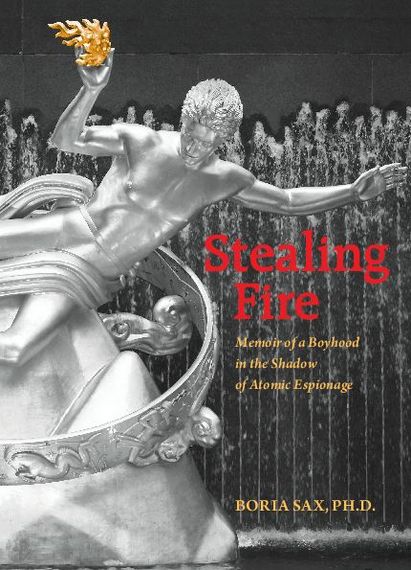When experience has been ordered, processed, edited, and cataloged, we call it "history." That bears about the same relation to the chaos of events in progress as a stack of boards and a bag of leaves does to a wind-battered tree in August. Physicists theorize that we each have a double made of anti-matter somewhere in the cosmos. If you were to find your double and shake hands with him, both of you would vanish. Perhaps we each have a "double" in history as well, and to encounter that person would be similarly hazardous. When "normal life" collides with history, at any rate, both become unstable.
My late father, Saville Sax, came from a family of Russian Jews that immigrated to the United States in 1914 and converted to Communism. He worked as a spy for the Soviet Union, passing secrets that he obtained from a friend at the Manhattan Project. Later, he was thoroughly investigated by the FBI, which tapped his phone, searched his garbage, "interviewed" all his acquaintances, monitored his bank accounts, and interrogated him, among other things. Most ominously, the FBI said that it would consider the use of what it referred to as "highly controversial investigative techniques." For reasons that have not yet been entirely clarified, the FBI opted not to prosecute him, but I believe my parents' reaction to the harassment caused trauma within our family.
American culture in the fifties and early sixties was pervaded by an idyllic dream of domesticity. My mother cultivated the trappings of what was regarded as "normal" family life. We had picnics, excursions, and formal dinners out. I joined the Cub Scouts, and my mother became a Den Mother. At times, we may have seemed typical to the point of being dull. And the format of our textbooks, so carefully organized by eras, seems to confer a stately dignity and special importance on historical events. But, looking back, I wonder if the paraphernalia of normality could have been, at least in part, a front, to hide my father's spying. And the glamor of historical importance seems a far greater fraud still, and it is almost funny that the fate of empires could be determined by events so ridiculously arbitrary.
I met that proverbial "double" when I finally obtained my father's FBI file, at least the almost miniscule portion that I was able to obtain under the Freedom of Expression Act. When I was a hardly more than a year old, my father drove a taxi and my mother worked as a waitress. One day in early 1951, he had a burst of temper when he got home from work and she was slow about making breakfast. He wrote about what happened in a journal, which was duly noted by the FBI:
Sue said that she would not talk to me if I yelled. I started to make the meal myself; she walked out and talked very sweetly to Boria. This is always her reaction to an argument. Withdrawal. And deep brooding resentment that lasts for months. In making the salad, I threw the cut-off pieces to the ground. I threw the empty container of milk on the ground. Sue just kept on talking sweetly to Boria, while dressing him to take him out.
I cannot touch my double, but the words bring back all sorts of half-formed impressions, feelings, and faded memories, which never fit neatly into the frameworks that people use to understand history today.
How can I make at least an uneasy peace with the past, and move on? Some of my friends probably think that I should be indignantly denouncing the crimes of J. Edgar Hoover and the FBI. Others, on the reverse side of the political spectrum, doubtless think that I more intensely denounce the crimes of Communism. Well, I have tried both these alternatives a bit, but they did not seem to satisfy my duty as a writer to focus on, learn from, and endeavor to understand my experience. To put the matter a bit less euphemistically, they are both hackneyed now.
I can never master that past, but, simply by speaking about it honestly, I hope to show that it has not completely mastered me. In my recent book Stealing Fire: Memoir of a Boyhood in the Shadow of Atomic Espionage (2014), I simply attempt to reconstruct what happened, however messy, enigmatic, and outrageous that might be. This is not "history"; it is also not a simple record of "experience." Rather, it is an encounter between the two.

